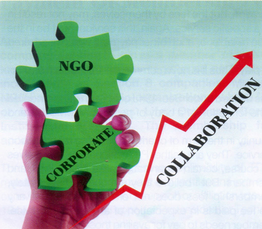|
The Indian Companies Act 2013 has considerably impacted the relationship that companies used to have with NGOs. From acting as ‘benevolent giver’ to ‘grateful beneficiaries (NGOs)’ the relationship has evolved to one of partnership and collaborative action. In fact, under the CSR Rules NGOs are referred to as the company's “implanting agency” for CSR activities.
Abstract
CSR in India has evolved from merchant philanthropy to social development oriented activities by companies. But CSR has always been discretionary in nature by the corporate organizations. Some companies have been outstanding in the CSR domain, while many companies involved themselves in CSR activities for image building. Yet many companies were unconcerned about their social obligations. The new Companies Act of 2013 made CSR mandatory for a class of companies effective from April 2014. This article discusses the CSR legislation of the government of India and its implications. Abstract
The purpose of this article is to provide a general summary of the CSR perception and operation in the Indian context. This article focuses in exploring the understanding of the various CSR operations in India. The article reviews the current operational challenges of corporates and in particular after the CSR bill implementation process. The article also focuses on the key stakeholders within the organization responsible for CSR implementation, role clarity and social development understanding. Need-based community issues and duplication of projects are also explored in detail. The responsibilities of industry organizations like CII, NASSCOM, FICCI & IICA are also highlighted in advocating for CSR. NGO partnership issues were also explored along with the government stakeholders’ participation in the social development issue. This article is purely based on the secondary data and tries to focus on the findings and reviewing of the issues and challenges faced by all the stakeholders involved in CSR. Ramkumar Sethupathy CSR Consultant, UNICEF
Abstract
What makes Corporate Social Responsibility a hand in hand proposition with social development? Is social vision a derivative of business vision or is it otherwise? WIPRO is an excellent example of how there could be a strong connection, interdependence and contribution in both business and social responsibility without compromising on both. This article traces the history, orientation, and attitude that supports the CSR sustainability. It also gives a peek into the nature of programs run by WIPRO that makes it a nation building partner than merely a supporter of social development. The article brings out the truth that unless there is a personal orientation towards social responsibility a larger organizational interest cannot be generated. Premji’s life and vision makes an excellent case study to articulate on these foundational dimensions of CSR. Dr. Kalpana Sampath Director of Arpitha Associates Pvt Ltd.
Abstract
Corporate Social Responsibility (CSR) in India as well as all over the world is a shift from industrial philanthropy of the past into strategic set of programmes to address the concerns of the stakeholders, besides the stockholders, what is commonly referred to as the “triple bottom line”—people, planet, and profits. Manifestations of grave wealth inequalities in the world as well as in India, widespread poverty, destruction of the environment, frequent natural disasters because of climate change, and wars, terrorism, and political conflicts have discredited the capitalist mode of wealth accumulation. Societies based on unlimited wealth accumulation and mass consumption are unsustainable. CSR, promoted by the United Nations Global Compact, is a feeble effort to counteract it. Revolutionary changes that go beyond CSR, and move our society toward the Gandhian vision of Gram Swaraj—self-governing, self-sustaining, decentralized and democratic village eco-communities, assuring good quality of life and wellbeing, are vital. This alone will save humankind from an impending apocalyptic sixth extinction predicted by climate scientists. Dr. Henry J D’Souza Professor, Grace Abbott School of Social Work, University of Nebraska at Omaha, USA Abstract
The article examines the different explanations of the concept of CSR, and the strengths and weaknesses of CSR. It discusses the shift from CSR to CSV (Creating Shared Value) by enlightened companies across the globe. CSR in India has evolved from merchant philanthropy to social development oriented activities by companies. But CSR has always been discretionary in nature by the corporate organizations. Some companies have been outstanding in the CSR domain, while many companies involved themselves in CSR activities only for image building. The new Companies Act of 2013 made CSR mandatory for a class of companies. This article also discusses the CSR legislation of the government of India and its implications. Key Words: Corporate social responsibility, creating shared value, employee volunteering, HR practices. K.N. Ajith Vice-President (Human Resources), Mytrah Energy (India) Limited, Hyderabad-500032 Abstract
This article looks at the role Corporate Social Responsibility (CSR) has in community development. Besides a universally accepted role in philanthropic work of corporations, CSR projects are today achieving greater sustainability in their efforts resulting in growth and change in communities. This evolution has been possible due to the collaboration of corporations with the development sector, especially the NGOs. From the past fifty years the western world has been looking at several dimensions of CSR; legal, ethical as well as discretionary. But in India, It is only in recent years that dedicated CSR departments and staffs have appeared in companies. These trained professionals are designing effective community oriented projects which are transforming communities albeit in a small focussed manner. This article will carry a short case study of one such CSR project of a large Multinational corporation functioning in India. This article stresses on the potential that CSR projects have in the face of criticisms coming from certain quarters. Keywords: Corporate Social Responsibility, Community development, Internal and External CSR, community oriented projects. |
Categories
All
Social Work Learning Academy50,000 HR PROFESSIONALS ARE CONNECTED THROUGH OUR NIRATHANKA HR GROUPS.
YOU CAN ALSO JOIN AND PARTICIPATE IN OUR GROUP DISCUSSIONS. MHR LEARNING ACADEMYGet it on Google Play store
|
SITE MAP
SiteTRAININGJOB |
HR SERVICESOTHER SERVICESnIRATHANKA CITIZENS CONNECT |
NIRATHANKAPOSHOUR OTHER WEBSITESSubscribe |
MHR LEARNING ACADEMY
50,000 HR AND SOCIAL WORK PROFESSIONALS ARE CONNECTED THROUGH OUR NIRATHANKA HR GROUPS.
YOU CAN ALSO JOIN AND PARTICIPATE IN OUR GROUP DISCUSSIONS.
YOU CAN ALSO JOIN AND PARTICIPATE IN OUR GROUP DISCUSSIONS.
|
|











 RSS Feed
RSS Feed





